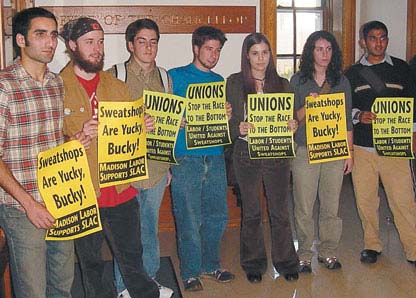
MICAH LANIER/Herald photo
from The Badger Herald, Tuesday, October 18, 2005

MICAH LANIER/Herald photo
by Andy Kim
The Student Labor Action Coalition and the Labor Licensing Policy Committee held a press conference at Bascom Hall Monday to discuss the proposed "Designated Suppliers Program" aimed at ending the University of Wisconsin and other universities' use of sweatshops as producers of school apparel.
During the conference, SLAC member Joel Feingold said the program is the "only sustainable solution to the ongoing problems in the garment industry."
The proposed policy's principal aspects include two main guidelines to ensure school apparel is not produced in sweat shops.
"One [is] that universities source from unionized factories, or factories with a comparable employee body," Molly Glasgow, SLAC member and intern for the Associated Students of Madison Worker's Rights Campaign, said. "And two, that brands pay a higher price per good so that workers can negotiate a living wage."
According to a SLAC release, the program will require university apparel to be provided by factories "that have been determined by universities to have affirmatively demonstrated full and consistent respect for the rights of their employees."
The approved factories include those designated by the Worker Rights Consortium, a national organization of college students and administrators dedicated to assisting "in the enforcement of manufacturing codes of conduct adopted by colleges and universities."
The SLAC release stated that for a factory to be designated by the WRC, it must demonstrate full compliance with internationally recognized labor standards, have its employees represented by a legitimate labor union, pay employees living wages and produce clothing primarily for the "university logo goods market."
However, the main power behind the proposed program lies not in the WRC but rather with the workers, Feingold said.
"We give the power of enforcement of the code of conduct not to the WRC, although the WRC retains its role as the fire alarm," he said. "But the workers themselves become the monitors in some sense."
After unanimously winning the votes of the LLPC, those present at the conference hummed on their way to Chancellor Wiley's office to deliver the policy recommendation.
"We hope that the Chancellor shares the Labor Licensing Policy Committee's passion," Glasgow said after sliding the proposal underneath Chancellor Wiley's door. "And we demand nothing less than his undivided attention - let's end UW's abuse of sweatshops!"
The work done by the LLPC, SLAC and their allies is directed toward the common goal of a better work environment for the factories of the world, LLPC student member Liana Dalton said.
"We're lifting the boot on [the sweatshops] that keeps stomping them down," Dalton said, adding the passing of the policy would create "a marketplace for goods produced in good factories [and] completely alter the dynamics of the collegiate apparel industry in a really positive way."
Riding the momentum instilled after the passing of SLAC's "livable wage" referendum - which prohibits the Student Services Finance Committee from hearing auxiliary budget proposals from various UW services unless they pay all of their employees slightly above $10 per hour - the committee hopes to continue to keep wage reform at the forefront of campus debate.
"Workers and students will not take no for an answer," Glasgow said. "We have brought this powerful new policy to end UW's compliance with sweatshop labor to the chancellor's office for a second time, but this time we have official administration support."
Though the referendum was officially passed, the university has decided not to adhere to its regulations after administrators felt the policy only pertained to the SSFC.
"It is a legal referendum," Glasgow said. "The fact they are failing to see that is something that I don't agree with."